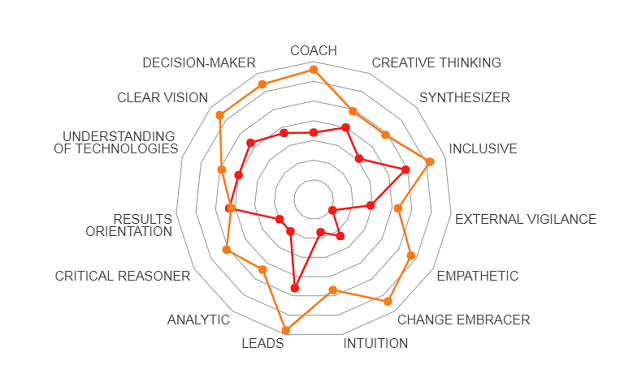
Accenture Strategy’s New Rules for Engagement Report – based on interviews with 200 C-suite executives globally and a survey of more than 1,300 employees and consumers in the UK – looks at how proactively reskilling the C-suite can lead to both personal and bottom line benefits. C-suite leaders are now contending with an emerging supergroup of employee and consumer stakeholders who share a common mindset about how business needs to change.
This “supergroup” are voicing their opinions and concerns on everything from workplace rights, climate change and executive renumeration.
Key findings from the report include:
- Nearly three-quarters of this “supergroup” of employees and consumers believe they have the potential to destroy company value in the long term.
- These disruptive forces are motivating the C-suite to implement a human-centered approach to leadership, with 82% of C-suite executives intend to reskill in the next three years.
- While 89% of the C-suite has formal training in business, science or technology, 65% say right-brain skills including intuition, empathy and self-awareness are their greatest weakness.
- The companies that have adopted a stronger balance of skills report on average 22% higher revenue growth and 34% higher profitability.
The ‘Whole-Brain Leadership: The New Rules of Engagement for the C-suite’ report from Accenture Strategy – which is based on interviews with 200 C-suite executives globally and a survey of more than 1,300 employees and consumers in the UK – identified a new influential group of stakeholders with the power to either destabilise or uplift businesses. Combined with other disruptive forces, like emerging technologies and new market entrants, this group is motivating the C-suite to implement a human-centred approach to leadership. This ‘whole-brain’ approach balances “left” (scientific) brain skills with increasingly valued “right” (creative) brain skills, such as empathy, innovation and intuition.
“Pressures are compounding on the C-suite like never before. The complexity and intensity of disruption is challenging executives in the UK to transform leadership styles and strategies on their journey to achieve competitive agility,” said Mark Knickrehm, group chief executive, Accenture Strategy.
An emerging supergroup
The study identified a powerful group of employees and consumers in the UK – dubbed the ‘Pathfinders’ – who represent an additional pressure to the C-suite and share a common mindset about how leadership needs to change. Their demographics defy convention, spanning evenly across gender and generations from Gen Z to Baby Boomer.
The UK’s Pathfinders are seven times more likely to take action in numbers against their employer, and 62% have already taken disruptive action by voicing their disappointment as a customer. Seventy-six percent of Pathfinders say that social media has increased the power of their voice in the companies where they work, and 66% say it has enabled them to influence the behaviour of the companies they buy from.
New style of leadership required
The UK’s Pathfinders are demanding a new type of leader to engage their passion and capabilities, one that has a strong balance of human-centred and analytics-led skills. The majority (89%) of today’s C-suite hold business school, science or technology degrees and have honed left-brain skills – such as critical reasoning, decision-making and results-orientation. While these skills will always be valuable, C-suite leaders recognise the need to strengthen their right-brain skills for a well-rounded whole-brain skillset. Sixty-five percent say that right-brain skills are their weakest and only 8% report their organisations using a whole-brain approach today.
In today’s volatile business environment, this balance is no longer an option. C-suite leaders recognise this reality with 82% saying their organisation intends to use a whole-brain approach in the next three years. The companies that have already adopted a whole-brain approach see a positive bottom-line impact and realise on average 22% higher revenue growth and 34% higher profitability.
“C-suite leaders are aware of the challenges that face them at a macro-economic level, company level and now on a deeply personal level,” said Peter Lacy, senior managing director, Accenture Strategy. “Reskilling to change the style of leadership, by combining data, creativity and a human-centred approach, is now crucial to building enduring businesses that generate stronger growth and profitability.”
The UK’s C-suite must adopt a whole-brain approach to leadership and secure the future of their companies through:
- Addressing the skills gap: Changing the mix of leadership skills at the top of companies will help address the current skills gap. C-suite leaders recognise this need for change, with nine in 10 C-suite executives already taking action by using organic and inorganic ways to tackle the problem. Over half (55%) of companies surveyed are already re-skilling C-suite members, and 46% are bringing in new talent from outside their organisation to address the challenge.
- Relinquishing some traditional leadership: Harnessing the power of the Pathfinder group is essential. By embracing them, allowing their voices to be heard and insights acted upon, the C-suite will gain allies and re-credential their leadership. By leveraging these natural agents of change, companies will benefit significantly as Pathfinders are two times more likely to be motivated to give their best to their employer, and twice as likely to choose a more expensive brand because they prefer what it stands for.
- Driving change deep and wide: Proactively ingraining data-led and human-centred skills into the leadership of organisations is crucial to longevity and competitiveness. The C-suite must build these balanced skills and use them at both the organisational and individual level. This will enable senior executive teams to leverage a whole brain approach to solve higher value problems that today’s combinatorial effects of disruption present.
The Whole-Brain Leadership: The New Rules of Engagement for the C-suite report from Accenture Strategy, interviewed 200 C-suite executives across France, Germany, Italy, Spain, the UK and US, and surveyed more than 1,300 employees and consumers in the UK, as well as conducting in-person focus groups. The study found that leadership teams that actively acquire, deploy, demonstrate and embed diversified whole-brain thinking across the organisation fare better financially than those that don’t.
